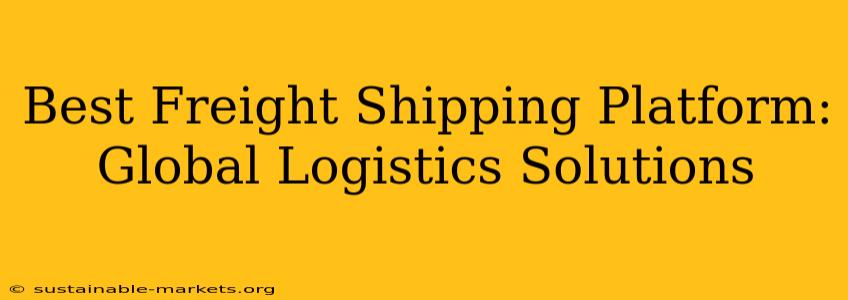Finding the best freight shipping platform for your business can feel overwhelming. With so many options available, choosing the right one depends heavily on your specific needs, shipping volume, and budget. This guide explores the key factors to consider when selecting a global logistics solution and highlights some of the features that make a platform truly stand out. We'll delve into the intricacies of choosing the right partner for your freight shipping needs, ensuring you make an informed decision.
What Makes a Freight Shipping Platform "Best"?
The term "best" is subjective. What constitutes the best freight shipping platform for a small business shipping a few pallets a month will differ significantly from the requirements of a multinational corporation handling thousands of containers daily. The ideal platform will depend on several factors, including:
- Cost: Freight shipping costs can vary dramatically depending on the carrier, route, and shipment size. Consider not only the base shipping rate but also any surcharges, fuel surcharges, and handling fees.
- Speed and Reliability: How quickly do you need your goods to arrive? Some platforms prioritize speed, offering expedited shipping options, while others focus on cost-effectiveness, prioritizing slower, more economical routes. Reliability, measured by on-time delivery rates and damage claims, is crucial.
- Tracking and Visibility: Real-time tracking and visibility into your shipments are essential for efficient supply chain management. A good platform will provide detailed tracking information, including estimated arrival times, location updates, and any potential delays.
- Ease of Use: The platform's user interface should be intuitive and easy to navigate, even for users without extensive logistics experience. A user-friendly platform saves time and reduces errors.
- Customer Support: Reliable and responsive customer support is essential, especially when dealing with complex shipments or unexpected issues. Look for a platform with readily available support channels, such as phone, email, and live chat.
- Global Reach: If you're shipping internationally, ensure the platform has a wide network of carriers and can handle customs clearance in various countries.
- Integration Capabilities: Seamless integration with your existing enterprise resource planning (ERP) system or other business software can streamline your operations and improve efficiency.
What Features Should I Look For?
Beyond the basic functionalities, several advanced features can significantly enhance your shipping experience:
- Automated Shipping: Automated shipping tools can streamline the process, reducing manual data entry and potential errors.
- Rate Shopping: Platforms that allow you to compare rates from multiple carriers can help you find the most cost-effective shipping options.
- Customs Brokerage: If you're shipping internationally, consider a platform that offers customs brokerage services to simplify the process.
- Insurance Options: Protecting your shipments with insurance is crucial. Ensure the platform offers adequate insurance coverage options.
How Do I Choose the Right Platform for My Business?
Choosing the right freight shipping platform requires careful consideration of your specific needs and priorities. Start by identifying your key requirements: shipping volume, budget, desired speed, and global reach. Then, research different platforms, compare their features and pricing, and request demos to assess their user-friendliness. Read reviews from other users to get an understanding of their experiences.
What are the Different Types of Freight Shipping?
Understanding the different types of freight shipping is vital for choosing the right platform. Common types include:
- Less-than-truckload (LTL) Shipping: Ideal for smaller shipments that don't fill an entire truck.
- Truckload (FTL) Shipping: Best for large shipments that require an entire truck.
- Intermodal Shipping: Combining different modes of transport (e.g., truck and rail).
- Air Freight: Fastest but most expensive option for urgent shipments.
- Ocean Freight: Most economical option for large, non-urgent shipments.
Are There Any Free Freight Shipping Platforms?
While many platforms offer free trials or basic services, comprehensive freight shipping platforms typically involve subscription fees or per-shipment charges. The cost should be weighed against the features and benefits offered.
Conclusion
Choosing the best freight shipping platform requires careful consideration of your specific needs. By focusing on cost, speed, reliability, and user experience, you can find a platform that streamlines your shipping operations and helps your business grow. Remember to research thoroughly, compare options, and read reviews before making a decision.

